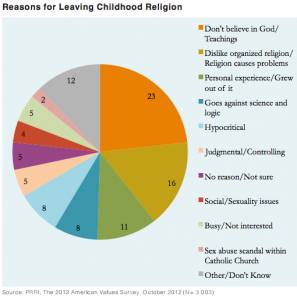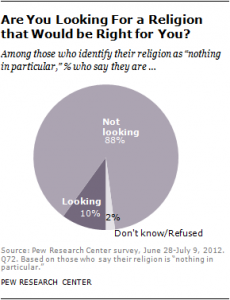
One of my favorite authors, Dr Jerry Coyne, recently wrote about a friend of his (a fellow nonbeliever) who raised this complaint about New Atheism:
The real problem with New Atheism is that while it attacks religion, it fails to provide a substitute. Religion fulfills fundamental needs in people, and unless New Atheists can suggest other, non-theistic ways to meet those needs, it will not be successful.
This criticism is way too common. Among humanists and secularists it rises to the very top. The late Paul Kurtz said in an interview in 2007:
Kurtz worries that, even worse, the momentum he helped build toward a less faith-bound world is now overly focused on attacking religion, at the expense of other goals.
“It’s become fixated in recent years on atheism, the criticism of religion,” he said. “And I think that’s a strategic blunder. Not just a strategic blunder, but a philosophical and ethical one, as well.”
“Let’s say the atheists are successful, and religion continues to decline, so what do you have, a vacuum?” he said. “That’s really the burning issue in America today: How shall I live? What should I strive for?”
When I wrote earlier on this subject, a commentator phrased the criticism this way:
Dawkins barely scratches the surface of what it means to live a life governed by rational beliefs and emotional desires, because he is still largely focused on beliefs only. And the same can be said of atheism/humanism generally. We need leaders who can construct a philosophy of desire (informed by reason). Awe and wonder for the universe is not enough to capture the hearts of Joe Public.
I find the latter statement offensive and patronizing. Such things are good for us, the elite, but not the unwashed masses.
So, is this criticism fair?
I disagree that the New Atheists have not offered anything positive alongside their criticism of religion. There are few people in this world who have done more for public understanding of science than Richard Dawkins. Sam Harris has written a full length book on morality based on collective human well being, and Christopher Hitchens wrote extensively in praise of Tom Paine’s “the Rights of Man”. Criticism of religion doesn’t even form the bulk of these authors’ writing; rather, they became famous for that simply because it is so taboo.
But supposing that they had in fact nothing to say other than harsh words against religion, how bad would that be?
Does it make you unpersuasive if you simply tell religious people their beliefs are wrong? Is a replacement faith/philosophy all so mandatory? Evidence suggests otherwise.
In the recent Pew survey on religion, an overwhelming majority of the ever-increasing religiously unaffiliated people said they were not looking for another religion.
And in the Public Religion Research Institute study, while people offered many different reasons for leaving religion, curiously, having found a more compelling philosophy was not one of them.
So the critics’ point is not a valid one. If you agree that religion has an overall negative impact on human society, trying to fight it is a positive contribution. Obsessing with a “replacement” is just a distraction.
Can we now move on?

